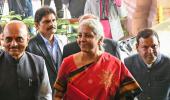Various rights groups on Thursday alleged that the Union Budget for the financial year 2023-24 has very little to offer for the marginalised -- the vulnerable children, the disabled and the elderly.

The National Platform for the Rights of the Disabled (NPRD), in a statement, claimed that the disabled community continued to be neglected.
"This year's budget has been no different as far as the disabled community is concerned. They continue to be condemned to the margins and neglected, high-sounding rhetoric like 'inclusive India' notwithstanding," it said.
NPRD said that in comparison to the previous year, there is merely a one per cent rise in allocation for the sector. It also highlighted that the amount allotted for FY 2022–2023 was underutilized by Rs 196 crore.
The allocations for the scheme for implementation of the (Rights of) Persons with Disabilities Act have been severely reduced by Rs 90 crores, from Rs 240.39 (BE) last year to Rs 150 crore this year.
"It is the woefully inadequate allocation that is mainly responsible for the failure in implementing the provisions of accessibility within five years as mandated by the RPD Act.
"Sadly, even the support for important autonomous bodies established by Acts of Parliament that cater to persons with disabilities, like the National Trust and the Rehabilitation Council of India, remains the same," the NPRD said.
It also criticised the government's move to remove the income criteria in the Pradhan Mantri Jan Arogya Yojana for persons with disabilities.
The allocations for the Indira Gandhi National Disability Pension Scheme remain unchanged at Rs 290 crore as compared to last year.
"The government has refused to enhance both the amount and the coverage of the pension. The amount has remained unchanged at Rs 300/- for more than a decade and covers a mere 3.8 per cent of the disabled population identified by the 2011 census.
"One has to have a disability of 80 per cent and above and has to fall under the BPL category to avail the benefit of this scheme," it said.
For HelpAge India, which works with the elderly and supports geriatric initiatives, the move to provide tax relief for the salaried middle class is a definite plus as it will also benefit senior citizens and their households.
"We were however expecting specific tax measures and enhancement of existing limits, relating to some of the provisions that were applicable for senior citizens under sections 80C, 80 TTB, 80D, 80DDB etc.
"Many senior citizens are in the informal sector and are out of the tax bracket and living either close to or below the poverty line. For them we were especially rooting for social security measures which would have benefitted them, it said.
Many senior citizens are vulnerable and special efforts are needed to reach them, HelpAge India said.
"We, therefore, appreciate the focus given to inclusive development, infrastructure creation and reaching the last mile. In the context of Amrit Kaal, we hope that the government will take specific measures for the elderly," said Rohit Prasad, CEO of HelpAge India.
Children's rights advocacy NGO, CRY, said that children, once again, remained out of the radar of the Union Budget.
While the group applauded the fact the budget 2023-24 has tried to trace a robust roadmap towards inclusive growth for the country in the post-COVID times, "children who constitute more than one-third of India's total population seem to have largely remained out of its radar.”
"There has been a 0.05 percentage points decline in the share of allocation for child budget to the Union Budget from 2.35 per cent (2022-23 BE) to 2.30 per cent (2023-24 BE).
"Further analysis reveals that, in reference to GDP, the percentage share of Child Budget to the GDP has declined to 0.34 per cent in 2023-24 BE when compared to 0.36 per cent in 2022-23 BE," said Puja Marwaha, the CEO of CRY.
"In all, as the detailed budget allocations across child-centric programmes and initiatives suggest, it seems that the Union Budget will fail to reach the last mile when it comes to the overall development of the vulnerable children, residing under the shadows of multi-dimensional poverty," she said.
Sudarshan Suchi, CEO of Bal Raksha Bharat (Save the Children, India) appreciated the budget's emphasis on the education of children by building a culture of reading through the announcement of the National Digital Library for Children and Adolescents.
She, however, said the protection and nutrition needs of children deserved greater attention in Finance Minister Nirmala Sitharam's speech.
"We are hopeful that the announcement of the 500 aspirational blocks programme will ensure saturation and penetration of government schemes and programs to the last mile, including children.
"The announcement of the launch of the Pradhan Mantri PVTG Development Mission and formation of a roadmap under the Development Action Plan for the scheduled tribes in the next three years is an appreciative step in the direction of reaching the families and children in the most vulnerable community with basic facilities of clean drinking water, sanitation, health, education and nutrition to ensure their well-being and holistic development," she said.










